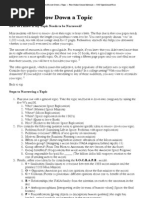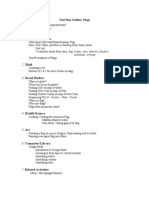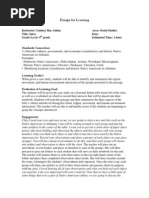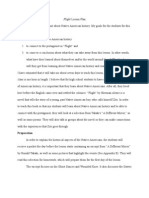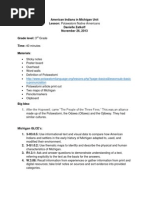Exploring Space: Speaking Classes For Intermediate and Advanced Classes by Lindsay Clandfield
Exploring Space: Speaking Classes For Intermediate and Advanced Classes by Lindsay Clandfield
Uploaded by
mariamcarullaCopyright:
Available Formats
Exploring Space: Speaking Classes For Intermediate and Advanced Classes by Lindsay Clandfield
Exploring Space: Speaking Classes For Intermediate and Advanced Classes by Lindsay Clandfield
Uploaded by
mariamcarullaOriginal Description:
Original Title
Copyright
Available Formats
Share this document
Did you find this document useful?
Is this content inappropriate?
Copyright:
Available Formats
Exploring Space: Speaking Classes For Intermediate and Advanced Classes by Lindsay Clandfield
Exploring Space: Speaking Classes For Intermediate and Advanced Classes by Lindsay Clandfield
Uploaded by
mariamcarullaCopyright:
Available Formats
EXPLORING SPACE
Speaking Classes for Intermediate and Advanced Classes
by Lindsay Clandfield
The following activities are all connected to the theme of space and space
travel. They are suitable for all learners from Intermediate level to Advanced
level. Each activity is outlined below, with possible language aims.
You can choose to do one, two or all three of the activities. Should you wish to
do all three, it is recommended that you do them in the order they occur below.
Warmer (all activities)
Write on the board the following words: Soyuz, Challenger, Columbia,
Shenzhou. Ask learners What do they all have in common? Answer: they are
all names of space ships (Soyuz is the name of a Russian rocket, Challenger
and Columbia are the names of American space shuttles and Shenzhou is the
name of the first manned Chinese rocket that was sent into space in October
2003). Ask learners to work in pairs and write as many words connected to
space and space travel as they can. Who can write the most words in two
minutes? Ask the pair that writes the most words to come up to the board and
write them up.
Exploring Space Speaking Activity #1: Guessing Game
Preparation: For this activity, you need a copy of the pictures worksheet. Make
copies of the pictures. There should be one picture for every two learners (i.e. if
you have twelve learners in your class, you will need two copies of the
worksheet). Cut the pictures out, then cut each picture in half diagonally.
Give each learner one half of the picture. Explain that they must find the other
half of their picture. They must follow these rules:
1. Do not show your picture to anyone.
2. Describe your picture to different people as specifically as possible and try to
find the other half.
3. Use only English.
Note that this activity requires learners to be quite specific in their descriptions,
as there are two different photos of each thing (2 photos of rockets from
different distances, 2 photos of space shuttles from different distances, 2 photos
of astronauts).
Language points: language for describing and speculating (it looks like it
could be it cant be )
Exploring Space Speaking Activity #2: First National Astronaut
Ask learners if they can tell you what three countries have sent people into
space (answer: Russia, United States and China). In October 2003, China sent
its first astronaut into space. It was a great honour for the country, and the
Macmillan publishers Ltd 2003
Downloaded from the speaking skills section in www.onestopenglish.com
astronaut is now considered a national hero. Explain that the learners are going
to decide who will be the next person to be sent into space for their country.
Outline the following situation:
Your country has decided to send its first manned rocket into space. The
National Space Committee is looking for the ideal candidate for the post of first
National Astronaut. It can be a man or a woman. The Committee is looking for
the person with the best qualifications and background to have the honour of
this job.
Now divide the class into groups of three or four. One group is the National
Space Committee. Every other group is made up of a candidate for the post of
first National Astronaut and his (or her) supporters.
Tell the groups they have ten to fifteen minutes. The National Space committee
must decide what kind of candidate they are looking for and what kind of
questions they are going to ask. The candidates and their supporters must plan
their backgrounds with as much detail as possible. After the time is up, have the
committee members split up and interview each of the candidates in turn. At the
end of the interviews, the committee has three minutes to decide who will
receive the job. They must then make their official announcement to the rest of
the class.
Language points: language for convincing (you should choose candidate x is
the best because) education lexis (degree in doctoral studies in
experience with)
Exploring Space Speaking Activity #3: Discussion Questions
Copy the following questions onto individual strips of paper. Make sure you
have enough copies of the questions so that there is one set for every three or
four learners. Divide the class into groups of three or four and give each group a
set of questions. They should put the questions all face down on the table. They
then take turns. One learner picks up a question and asks the others to answer.
Discussion questions
Did you want to be an astronaut when you were a child?
Do you think that there is life on other planets?
If you had the chance to go into space, would you take it?
Imagine you are going on a voyage into space. This voyage will be for
several months. You are allowed to take three personal items with you.
What items would you take?
Do you think that one day a human being will walk on Mars?
Do you think it is a waste of money to explore space?
Do you or anyone in your family remember the Moon landing?
Some people say that the Moon landing was a hoax. What do you think?
Do you think that Earth has been visited by extraterrestrials?
Language point: A lot of different language could come up here, but you could
pre-teach/review the second conditional which occurs in a couple of the
questions.
Macmillan publishers Ltd 2003
Downloaded from the speaking skills section in www.onestopenglish.com
Did you want to be an astronaut when you were a child?
Do you think that there is life on other planets?
If you had the chance to go into space, would you take it?
Imagine you are going on a voyage into space. This voyage
will be for several months. You are allowed to take three
personal items with you. What items would you take?
Do you think that one day a human being will walk on
Mars?
Do you think it is a waste of money to explore space?
Do you or anyone in your family remember the Moon
landing?
Some people say that the Moon landing was a hoax. What
do you think?
Do you think that Earth has been visited by
extraterrestrials?
Macmillan publishers Ltd 2003
Downloaded from the speaking skills section in www.onestopenglish.com
You might also like
- A Book I've Used - ETpedia Business English - MET PDFDocument2 pagesA Book I've Used - ETpedia Business English - MET PDFmariamcarullaNo ratings yet
- GPS Multiple Choice Questions and AnswerDocument8 pagesGPS Multiple Choice Questions and AnswerMohamed Hassan100% (2)
- Concept Attainment LessonDocument5 pagesConcept Attainment LessonMariah McKinnon100% (4)
- Final Demo: Detailed Lesson Plan in English 10Document13 pagesFinal Demo: Detailed Lesson Plan in English 10Rosanna Cruz De Leon100% (13)
- Sharing The Planet Up 1 17 13Document7 pagesSharing The Planet Up 1 17 13api-147600993No ratings yet
- Advanced Collocations PDFDocument7 pagesAdvanced Collocations PDFmariamcarullaNo ratings yet
- Assessing Speaking Performance at Level b1 PDFDocument13 pagesAssessing Speaking Performance at Level b1 PDFmariamcarulla100% (2)
- Mixed Tenses ExercisesDocument5 pagesMixed Tenses ExercisesmariamcarullaNo ratings yet
- Bridgewater College Teacher Education Program Lesson Plan: Virginia SOL/National StandardDocument7 pagesBridgewater College Teacher Education Program Lesson Plan: Virginia SOL/National Standardapi-333837477No ratings yet
- ADV Space - Lesson (ESL)Document13 pagesADV Space - Lesson (ESL)TardisNo ratings yet
- Chapter 6Document10 pagesChapter 6masrudi.mulsatiNo ratings yet
- Lesson-1_The-Magic-School-Bus-Lost-in-SpaceDocument5 pagesLesson-1_The-Magic-School-Bus-Lost-in-SpaceBrian NapierNo ratings yet
- Esl GR 5 1-9Document19 pagesEsl GR 5 1-9api-291672061No ratings yet
- Lesson Plan 2Document7 pagesLesson Plan 2api-280913075No ratings yet
- Great Planetary Debate1Document12 pagesGreat Planetary Debate1Merank Global MgNo ratings yet
- ESL GamesDocument11 pagesESL Gamesa_perfect_circle100% (2)
- Space FrontierDocument56 pagesSpace FrontiersekharNo ratings yet
- Thinking Like A Geographer - FinalDocument5 pagesThinking Like A Geographer - Finalapi-242330122No ratings yet
- Ways To Narrow Down A Topic - Free Online Course Materials - USU OpenCourseWareDocument2 pagesWays To Narrow Down A Topic - Free Online Course Materials - USU OpenCourseWareZepzep SarıaslanNo ratings yet
- English End of Unit testDocument7 pagesEnglish End of Unit testsherel.dsouzaNo ratings yet
- Learning Cycle A 321Document4 pagesLearning Cycle A 321api-302078407No ratings yet
- Er 2014 Unit 2Document28 pagesEr 2014 Unit 2api-235390537No ratings yet
- Reading Writing Lesson Plan RevisedDocument8 pagesReading Writing Lesson Plan Revisedapi-376073469No ratings yet
- Science Lesson PlanDocument8 pagesScience Lesson Planapi-297925548No ratings yet
- Day 4Document3 pagesDay 4api-271845359No ratings yet
- 2007 VBE Anglu UzsienioDocument16 pages2007 VBE Anglu UzsienioDenis VrublevskijNo ratings yet
- Our Solar SystemDocument1 pageOur Solar SystemYrynna ElennaNo ratings yet
- Film Activity - The TerminalDocument17 pagesFilm Activity - The Terminalbrosnan67No ratings yet
- How To Write An SLE: Sample SLEDocument11 pagesHow To Write An SLE: Sample SLEEsraRamosNo ratings yet
- SM2ed Teacher's Resources Worksheet I L4 U8Document5 pagesSM2ed Teacher's Resources Worksheet I L4 U8Fernanda SerralNo ratings yet
- Science Lesson For ElDocument3 pagesScience Lesson For Elapi-279742832No ratings yet
- Thematic UnitDocument19 pagesThematic Unitapi-404594523No ratings yet
- Lesson Plan 3Document11 pagesLesson Plan 3api-241193898No ratings yet
- Lesson 4Document8 pagesLesson 4api-279288252No ratings yet
- LP Songwhat A Wonderful WorldDocument7 pagesLP Songwhat A Wonderful WorldLea Marie CabandoNo ratings yet
- Astronomy Unit PlanDocument17 pagesAstronomy Unit PlanMariah McKinnonNo ratings yet
- Language Arts: Unit Plan Outline: Flags Grade Level: 1st - 2nd (Approximate) Time Frame: 2-3 WeeksDocument12 pagesLanguage Arts: Unit Plan Outline: Flags Grade Level: 1st - 2nd (Approximate) Time Frame: 2-3 WeeksZaeydeNo ratings yet
- Lesson 1 WordDocument3 pagesLesson 1 Wordapi-213637986No ratings yet
- Language Arts Lesson PlanDocument2 pagesLanguage Arts Lesson Planapi-354210676No ratings yet
- Science Lesson For 3rd GradeDocument3 pagesScience Lesson For 3rd Gradeapi-378880030No ratings yet
- Eled 3223 - Imb Lesson PlanDocument4 pagesEled 3223 - Imb Lesson Planapi-283076872100% (1)
- Get Into Shape Lesson Plan: Music CirclesDocument4 pagesGet Into Shape Lesson Plan: Music CircleslakeschoolNo ratings yet
- 1° Final Draft TBLDocument5 pages1° Final Draft TBLNatalia100% (1)
- Other Groups About Which Seed TextDocument2 pagesOther Groups About Which Seed Textapi-11614654No ratings yet
- Layers of The Earth Lesson PlanDocument3 pagesLayers of The Earth Lesson Planapi-240608311No ratings yet
- Class 6Document5 pagesClass 6Preeti SrivastavaNo ratings yet
- HW Feb 25, 2013Document2 pagesHW Feb 25, 2013Ivonne GuzmanNo ratings yet
- J4B Unit 10.1Document131 pagesJ4B Unit 10.1Huy VuNo ratings yet
- 3rd y Exam - 2nd Term - S1Document3 pages3rd y Exam - 2nd Term - S1mer pcNo ratings yet
- How Does Light TravelDocument4 pagesHow Does Light TravelVictoria AngelaNo ratings yet
- Indiana Wesleyan University Elementary Education Lesson PlanDocument5 pagesIndiana Wesleyan University Elementary Education Lesson Planapi-350000132No ratings yet
- Intro Lesson PlanDocument5 pagesIntro Lesson Planapi-242880618No ratings yet
- KWL Chart Educ555Document8 pagesKWL Chart Educ555Jessica DeSimoneNo ratings yet
- Pakistan Montessori Council: Assignment Module 08Document9 pagesPakistan Montessori Council: Assignment Module 08YasirNo ratings yet
- Science Lesson PlanDocument2 pagesScience Lesson Planapi-339056821No ratings yet
- Author To Her Book by Anne Bradstreet LPDocument4 pagesAuthor To Her Book by Anne Bradstreet LPMorgan ReidNo ratings yet
- English Presentation JoyDocument18 pagesEnglish Presentation JoyTabudi PhalaNo ratings yet
- Ed360a - Social Studies - Historical FiguresDocument3 pagesEd360a - Social Studies - Historical Figuresapi-528736424No ratings yet
- "Flight" Lesson PlanDocument9 pages"Flight" Lesson Plankdarb002No ratings yet
- GM7U3TRDocument14 pagesGM7U3TRdubeyprityi75No ratings yet
- How Does Light TravelDocument4 pagesHow Does Light TravelTan Yen PingNo ratings yet
- Sample LESSON PLAN IN ENGLISH - Demo - HumanisticDocument3 pagesSample LESSON PLAN IN ENGLISH - Demo - HumanisticNelly CerioNo ratings yet
- Potawatomi American Indians Lesson PlanDocument3 pagesPotawatomi American Indians Lesson Planapi-241525563No ratings yet
- Humans in Space (Big Ideas: Low Intermediate): Wayzgoose Graded ReadersFrom EverandHumans in Space (Big Ideas: Low Intermediate): Wayzgoose Graded ReadersNo ratings yet
- The Non Native Teacher (Third Edition), Swan Communication 2017Document2 pagesThe Non Native Teacher (Third Edition), Swan Communication 2017mariamcarullaNo ratings yet
- The Teacher's Portfolio: A Template To Document Your Work As An EducatorDocument15 pagesThe Teacher's Portfolio: A Template To Document Your Work As An EducatormariamcarullaNo ratings yet
- Cooperative LanguageDocument514 pagesCooperative LanguagemariamcarullaNo ratings yet
- Before You Start: Basic PrinciplesDocument24 pagesBefore You Start: Basic PrinciplesmariamcarullaNo ratings yet
- Classroom Activities For KET Practice PDFDocument22 pagesClassroom Activities For KET Practice PDFmariamcarullaNo ratings yet
- Appetizer: Listen To The PhraseDocument6 pagesAppetizer: Listen To The PhrasemariamcarullaNo ratings yet
- Prepositions Categories - Nov 2015Document5 pagesPrepositions Categories - Nov 2015mariamcarullaNo ratings yet
- Attempting To SolveDocument1 pageAttempting To SolvemariamcarullaNo ratings yet
- Idioms and Cpe SampleDocument25 pagesIdioms and Cpe SamplemariamcarullaNo ratings yet
- Intro Solar SystemDocument84 pagesIntro Solar Systemnnsdell100% (1)
- Chapter S1 (Celestial Timekeeping and Navigation) LEARNING GOALSDocument34 pagesChapter S1 (Celestial Timekeeping and Navigation) LEARNING GOALSМарко Д. СтанковићNo ratings yet
- List of Indian SatellitesDocument17 pagesList of Indian SatellitesVikash nagarNo ratings yet
- Formation of The Solar SystemDocument24 pagesFormation of The Solar SystemPHGreatlord GamingNo ratings yet
- 0741 How To Draw Sls 005042020Document11 pages0741 How To Draw Sls 005042020Aryn PhillipsNo ratings yet
- Arya in The Cockpit: Author: Nandita Jayaraj Illustrator: Upamanyu BhattacharyyaDocument2 pagesArya in The Cockpit: Author: Nandita Jayaraj Illustrator: Upamanyu BhattacharyyaChandani SenaratneNo ratings yet
- Astro 2gw Taline Gosta de Mim Hr.73825.185392Document1 pageAstro 2gw Taline Gosta de Mim Hr.73825.185392pedro restinxNo ratings yet
- Post Launch Report For Mercury-Redstone No. 2 (MR-2)Document110 pagesPost Launch Report For Mercury-Redstone No. 2 (MR-2)Bob AndrepontNo ratings yet
- Comets Asteroids MeteorsDocument36 pagesComets Asteroids MeteorsAlexander Nathan DanaoNo ratings yet
- Ames-_-Harvey-_2017_-Draw-50-Outer-Space-The-Step-by-Step-Way-to-Draw-Astronauts_-Rockets_-Space-StaDocument333 pagesAmes-_-Harvey-_2017_-Draw-50-Outer-Space-The-Step-by-Step-Way-to-Draw-Astronauts_-Rockets_-Space-Stawendy hostosNo ratings yet
- Words Can Go Horizontally, Vertically and Diagonally in All Eight Directions. Words May Overlap and Share 1 or More LettersDocument2 pagesWords Can Go Horizontally, Vertically and Diagonally in All Eight Directions. Words May Overlap and Share 1 or More LettersSathis SathisaedrrNo ratings yet
- Mind MapDocument1 pageMind MapSeige SinclaireNo ratings yet
- Getting Started: in This Module You WillDocument6 pagesGetting Started: in This Module You Willroxanne torioNo ratings yet
- Quran Aur AliensDocument25 pagesQuran Aur AliensImran AhamedNo ratings yet
- Cembrit Facade Colour GuideDocument1 pageCembrit Facade Colour GuideRoundmaruNo ratings yet
- Mock Cat 2Document88 pagesMock Cat 2Arshdeep SinghNo ratings yet
- Questions and Answers SectionDocument4 pagesQuestions and Answers SectionimanNo ratings yet
- Explanation Text Sun SetDocument4 pagesExplanation Text Sun Setbill noahNo ratings yet
- FIRST 27 ReadingDocument9 pagesFIRST 27 ReadingLorena Paradelo RomeroNo ratings yet
- STS-44 Press KitDocument35 pagesSTS-44 Press KitBob AndrepontNo ratings yet
- 24 03 07-24 03 25.sfosDocument20 pages24 03 07-24 03 25.sfosOster PaterNo ratings yet
- Astronomer Avi Loeb Says Aliens Have VisitedDocument1 pageAstronomer Avi Loeb Says Aliens Have VisitedDonald TrummpNo ratings yet
- TOPAZ Bing3Document6 pagesTOPAZ Bing3Anjarswari Erningtyas100% (1)
- CassiopeiaDocument5 pagesCassiopeiamsaravindNo ratings yet
- Commentariolus - Translation: NCT Archives Copernicus' Minor Astronomical Writings CommentariolusDocument4 pagesCommentariolus - Translation: NCT Archives Copernicus' Minor Astronomical Writings CommentariolusShaiful BahariNo ratings yet
- Waqar Ahmad (2019-Ag-8981 ID-511 Assignment#2Document12 pagesWaqar Ahmad (2019-Ag-8981 ID-511 Assignment#2Waqar AhmadNo ratings yet
- Immediate Download Pocket Genius Space Facts at Your Fingertips DK Ebooks 2024Document84 pagesImmediate Download Pocket Genius Space Facts at Your Fingertips DK Ebooks 2024ayogludevoto100% (11)
- Into The Groove - The Sun Earth and Moon Orrery Project Design BriefDocument3 pagesInto The Groove - The Sun Earth and Moon Orrery Project Design Briefapi-450445489No ratings yet
- Concept MapDocument1 pageConcept Mapapi-486564938100% (1)


















